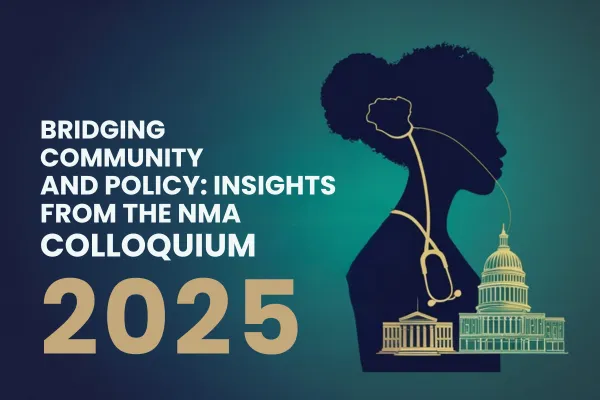
Insights from the 2025 National Medical Association Colloquium
By Rafat Fields | Powered to Rise
Why I Chose to Attend
The National Medical Association (NMA) Colloquium is a crucial annual convening that begins with a Hill Day, where members advocate directly with legislators for policies that impact their patients and communities. For me, choosing to attend this year was deeply personal.
Growing up on the South Side of Chicago, I saw firsthand the role that Black physicians play—not only as clinicians but also as community healers, advocates, and trusted guides through a healthcare system that often overlooks or underserves our people.

My connection to this work stretches back to childhood: I attended Adam Clayton Powell, Jr. Elementary School, named after the trailblazing congressman who fought tirelessly for civil rights and equity. During the Colloquium, as I walked the hallways connecting the basement offices of members of Congress, I came across an exhibit featuring Adam Clayton Powell, Jr. The moment felt full-circle—standing in the very halls of advocacy while recalling the roots of my own education and upbringing. It was a reminder that this work is generational, and that voices like NMA’s continue the legacy of leaders like Powell by carrying community truths into the heart of policy.
What I Experienced
The Colloquium was exactly what I hoped: a gathering of highly educated, deeply committed leaders who know their priorities, who know how to navigate policy landscapes, and who are equipped to fight for their communities. Being present gave me what I could not capture from the outside—specific stories, strategies, and examples of how NMA activates its members for advocacy.
It also validated my instincts. For years, I’ve believed in the importance of NMA, both from personal experience as a patient and professional experience in healthcare. Now I carry tangible examples that can translate into language decision-makers understand—bridging the gap between community truth and policy proof.
Alignment with Powered to Rise Priorities
As I reflected on what I witnessed at the Colloquium, I saw clear alignment with the advocacy pillars that guide Powered to Rise:
Workforce Development: NMA’s commitment to medical school pathways, student support, and residency success directly connects with our mission of building career pathways into healthcare and technology for underrepresented communities.
Medicaid & Community Health: NMA’s focus on defending and strengthening safety-net programs like Medicaid, CHIP, HRSA, and IHS resonates with our belief that these programs are lifelines for vulnerable populations and critical to equitable health outcomes.
Education & Special Education: While not a traditional healthcare issue, discussions of SNAP, school lunch programs, and educational pathways underscored how health, education, and opportunity are interconnected—mirroring our own commitment to designing systems that meet learners where they are.
Sessions That Stood Out
The Colloquium programming brought the breadth of minority health advocacy into sharp relief:
Climate Justice: Members shared stories of protecting outdoor and migrant workers from extreme heat and unsafe conditions.
Policy Partnerships: Panels included leaders from public health associations and the National Black Caucus of State Legislators, showing how multi-sector collaboration is essential to addressing disparities.

Community Partnerships: The opening convening, co-sponsored by Pfizer and BlackDoctor.org, demonstrated how pharmaceutical, media, and physician voices can join forces to amplify impact.

Gun Violence Prevention: A physician-led project spanning Chicago and Indiana illustrated the link between local action and federal advocacy.
Why NMA Matters
NMA is the nation’s largest and oldest professional organization representing African American physicians and their patients. With more than 50,000 members, its mission has always been clear: to improve the quality of health for minorities and disadvantaged populations. The organization was founded out of necessity—because Black physicians were once excluded from the American Medical Association. That legacy of exclusion underscores why NMA is still vital today.

Trust in healthcare is not automatic. For African American communities, it is earned—through representation, through relationships, through care delivered by physicians who know the lived experience of their patients. NMA embodies that trust and channels it into advocacy, education, research, and partnerships.
Discoveries and Takeaways

What I discovered at the Colloquium is that while NMA may not always be fully recognized in broader policy circles, its importance within the communities it serves is indisputable. The challenge—and opportunity—is to help power brokers, funders, and policymakers understand what communities already know: that NMA is an essential bridge to improving health outcomes for African Americans and beyond.
For Powered to Rise, this means continuing to lift up NMA’s work, ensuring they are at decision-making tables, and advocating for measures of value that go beyond algorithms and analytics to include trust, connection, and cultural competence.
Closing Reflection

The Colloquium gave me clarity: my instincts about the importance of NMA were always right. What changed is that I now carry lived examples that I can translate for audiences who need proof. That is what advocacy often requires—belief in the possibilities, with the ability to frame value in ways that resonate across power structures.
I left encouraged, inspired, and more committed than ever to ensuring that organizations like NMA are not only seen but also supported as vital partners in building healthier, more equitable communities.
Learn More
The National Medical Association (NMA) is a 501(c)(3) national professional and scientific organization representing more than 50,000 African American physicians and the patients they serve. NMA is committed to improving the quality of health among minorities and disadvantaged people through advocacy, education, professional development, and partnerships.
Pull Quotes

